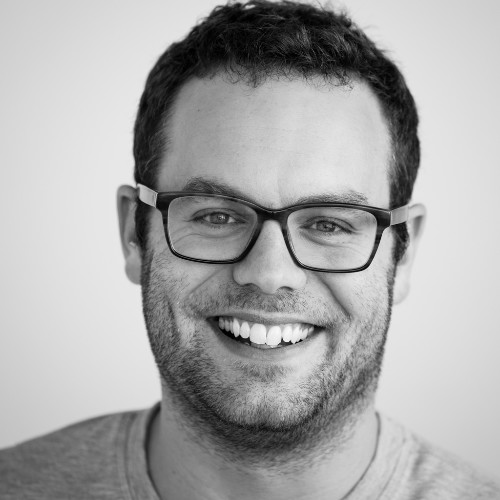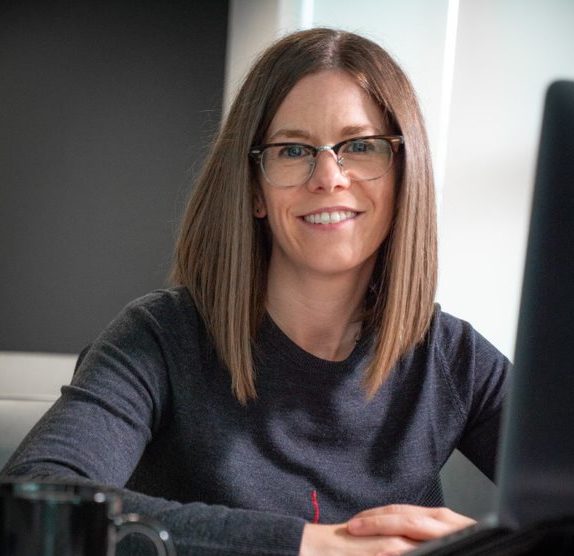
Welcome back to Work Minus, where we talk about what we need to drop from how we work and quick pivots that you can make today take closer to the future of work. Our guest is Erin Winick. She is the Associate Editor of The Future of Work at MIT Technology Review and this episode is Work Minus People. Hi, Erin. How are you today?
Doing great. Thanks for having me.
Yeah. I’m excited to have you on the show. You are a prolific researcher, writer, reader about the future of work, about technology, so I know you have a lot of insight to share with us. Tell us a little bit about your role as the Associate Editor. What’s your favorite part of that?
Yeah. So my favorite thing about it is I write our newsletter called Clocking In which is on the future work, which writing a newsletter very frequently lets me really go in depth to a lot of the news and research or reports that are coming out about it. So I feel pretty connected to all the new developments that are coming out in AI, in robotics and things like that.
And I would definitely recommend for anyone listening in to make sure you’re on that list. It’s a fantastic newsletter and it really encourages me as I research these topics too. So it’s something that you spend a lot of time on. I want to ask you a few questions about it. We talk a lot about the robots, we talk a lot about AI, lot of things that are out there. From your vantage point, how much hype is there out there about robots taking over our jobs and they’re going to be no jobs left, and how much of it is actually legitimate? What’s your opinion?
So, I think it definitely walks right in the middle. So I think a lot of the headlines out there that, you know, whenever we do feature work coverage, it all confused too far towards the, oh my gosh, everyone worry robots are taking our jobs. But I think that it’s still something that’s legitimately happening. There’s definitely a lot of people out there that have already lost their jobs to robots and as AI and things get more advanced, there definitely are more jobs that either are going to be more automated or automated completely. But I think it’s more like the reason that we get this sense of over hype is that there’s so much focus on the, you know, 70% of jobs are going to be lost to automation or things like that, like big overarching stats rather than kind of diving down into more of the meat of it.
Yeah. As I read it, I see two scenarios in the future. One is that we overhyped it and in 50 years, people are going to be reading this like, oh, wow, everyone just made a big deal of it. Or we underhyped it and in 50 years, we’re going to be like, we should have been a lot more concerned about that. It’s hard to know exactly where we should stand.
Yeah. That’s one of the hardest things with covering the future of work is, it’s easier to look back and see, you know, these are the jobs that were automated, this is how automation affected it. It’s a lot harder to look forward and predict especially when we really don’t know how much and how quickly AI and robotics and other technologies are going to advance.
Exactly. Now you mentioned both AI and robotics. A lot of times, people talk about robots taking our jobs, AIs taking our jobs. Are those the same things or what’s the difference between the two? And is there any overlap in them right now?
Yeah. So there’s definitely a difference between the two but when the two operate together, that’s when there’s a lot of potential. When we think about how the auto industry has been automated so far, a lot of it has been robots, dumb robots, robots that though can’t adapt, can’t do things differently if a different situation arises. They’re built to do one specific process and they do it very well, and they push cars down the assembly line. But when we’re talking about AI, there’s a lot more potential for robots to become more flexible. They could become better co-workers with humans, as well as, they can anticipate some things that their human partners are doing to be safer for humans. And they can adapt so that they can maybe pick up an item that they’ve never seen before, so we wouldn’t have to directly program them, this is how you pick up a ball, this is how you pick up a shirt. They can figure out what they need to do in the situation. So they’re definitely have been developing separately both industries, but now they’re increasingly coming together as both get more advanced, and that’s where some of the increased potential is for a future automation.
Now, you do a lot of research and work into jobs of the future, not just the future of work and how we are going to lose jobs. What are these new jobs that are being created? Share with us some of these positive new jobs you’ve seen open up as a result of this recent technology.
It’s definitely not just automating jobs and getting rid of some. There’s some really cool ones up there, some that are something like wind turbine technician or things like that that already exist and are growing substantially. And there’s jobs like that I’ve met for people that are doing for the first time, that we haven’t really seen before, and then a really cool woman who, her whole job was helping people organize all their digital assets for after they die. So ranging from making sure all your passwords are in one place, to, if you’re a photographer, making sure making sure all your photographs are preserved, authors making sure family members know what to do with your writing, if you don’t want things published, if you want things published, and that they’re all in Google Docs. So it’s really interesting to see almost like progression of — it’s not just preserving our physical assets, but preserving our digital ones too and making sure that family members you know how to stop your Blue Apron subscription box or something after you pass so it doesn’t keep auto charging. Then there’s also ones that are more related to this robotics and AI. For AI to develop, it needs data and humans are the ones who provide that data right now. So it’s interesting to see there’s jobs that are developing for people to help train these robots. There’s a company called Kindred AI that’s pretty cool, that is using human pilots to remotely pilot robots to do the tasks that the AI hasn’t yet learned how to do, and then this is providing data for the robots to then learn from and be able to then eventually do on their own. So although it’s a job of the future, they’re also automating themselves out of a job. So it’s kind of an interesting paradox there. So we are creating jobs but we don’t know how long they will last in that area.
Do you feel like this iteration is just going to keep going where we just try to stay one or two steps ahead of the curve, we create new jobs and then figure out automate those, and at the same time start to take one step ahead. Is that just going to keep going on until we’re out of luck?
Well, I think we’re always going to keep going. There’s going to always be some next iteration. I don’t think this is going to be the end of all work. There are definitely some things that are very hard to automate or that even humans would prefer not to be automated at some point. Like there’s a cafe out in San Francisco that opened that serves coffee via robot and they had to actually slow it down because people didn’t like it going so quick, or people get afraid if their coffee gets served too quickly by a robot. So there’s very human preferences that play into this, as well. It depends if you want your caretaker for your grandmother to be a robot or if you want that to be a human. There are some things out there that are still robot proof for us just because of societal preferences, and then there’s things that human, they’re just more efficient at, in general.
Your point going back about the digital assets that we have reminds me of a conversation I had earlier with someone about insurance and about how those in the auto insurance agency see the end of their term as autonomous vehicles come about and insurance rates will drop there. But the idea of digital insurance is something that, obviously, will be there to be able to manage your assets, to manage the things, to have somebody that can protect those things in the events that you can’t access them anymore. It’s a very interesting idea.
Yeah. And at the same time, we’ll probably need people who are experts in that, which is a new area and potential jobs to be created, as well.
Well, great! You do a lot of reporting on the future of work. You see all these things about the — we talked about hype before. Is there anything you’ve interacted with that genuinely scares you the most?
You know, I think more than anything, it’s that I don’t think we’re getting prepared as fast as we should be right now. It’s not like that I’m necessarily scared of the robots taking over. It’s more than I’m scared that it’s going to happen and we’re not going to have prepared appropriately for when more of these jobs get taken over. I think we really have to set ourselves up for success, whether it’s with policies that need to be put into place or if it’s developing things that ensure that AI isn’t biased, and making sure that all of these technologies are functioning in such a way that they really help society and not hurt it. I think seeing a lot of these facial recognition softwares come out that potentially have biases against certain skin colors, or if there’s a hiring algorithms that are trained on past data that might have already had some biases into it, I think what scares me the most is if we can’t get that under control. And there’s some cool people that are out there working on it now, but I think it’s something that we have to tackle. If these things are going to grow and the way that they are, it has to be a priority right now towards making sure it’s solved quickly and making sure that we continually pay attention to that as we move forward.
Yeah. The bias question for me is very important because I feel like, in some ways, if AI jumps in and takes everything now, it’s like our advancement as a species is frozen for a while, and so super intelligence comes in to take it to another level, but all of our biases, all of our prejudices are kind of set in codes, so to speak, so that they just keep reiterating as that goes on. So that scares me a little.
Yeah. And AI is just learning from us. It’s not doing anything else yet. It doesn’t have the ability to think on its own. Everything that we’re feeding into it, if there’s human bias in it, it’s going to stick around in the machines too.
So we talked about what scares you. What genuinely gets you the most excited?
So I have a Mechanical Engineering background, so I have to say I definitely nerd in a lot of the robotic stuff. I really think that, although there is worries about jobs being automated, there’s a lot of opportunity for increased productivity in business, that we haven’t necessarily seen in the productivity statistics yet, but I think as we continually go down the line, there’s a lot of potential to make processes more efficient, make better products, make products cheaper, and things will really help society in being able to do that. I personally am a huge fan of 3d printing, as well, and I think that there’s a lot of really interesting dynamics from the manufacturing space to be able to combine multiple of these different technologies, AI, robotics, and 3d printing. People talk about these potentials for lights-out factories and stuff down the line, which is a factory without humans working in it. But I think that if we’re able to actually get to that level, I think there’s some cool opportunities to be able to apply human skills elsewhere and not on some of those more mundane processes. And I think that by pairing all these together, there’s a lot of really interesting potential to the future.
Tell us more about 3D printing. It’s something that we’re all aware of. But what are some of the interesting things you’ve seen recently that a normal person may not be exposed to?
Sure. I think one of the most exciting things with metal 3D printing is getting a lot better. The thing that people often still associate 3D printing like there’s these plastic printers that sit in a library so you can go pick up at Staples are Barnes and Noble, at this point. But the ones that are really making impacts are some of these steel, aluminum, these high precision metal printers which are fully coming down in cost. I think, just last year, Markforged released the first metal printer under $100,000, which is still expensive, but that’s a big step. Desktop Metal is a really cool company that’s based near me, over at MIT, that’s making metal 3D printing a lot faster, which that’s what always been one of the biggest hurdles for 3D printing, is that it takes a long time to make stuff with it, it’s expensive, which I said, those costs are coming down. A lot of these barriers are slowly starting to fall down, and I think while the hype cycle for 3D printing, everyone got really excited a few years back, and then isn’t paying attention to it as much anymore. I think over the next few years, we’re really going to see it come into some of these other industries where the businesses are going to start seeing the case for, okay, this is actually something we can use in our final product. It’s not just something for prototyping. It’s already going into some higher-end cars and jets and stuff. I think, there’s even a company that’s now using it to create mascara brushes. So it’s starting to enter into the workflow of more businesses, which is pretty exciting.
Now, obviously, you write for MIT Technology Review. When we talk about the future of work, we’re always talking about technology. But what’s one thing that’s non-technical do you feel like we’re not talking about enough, that’s going to affect the future of work?
I think I definitely go back to policy. As unexciting as that sounds, there’s a lot of roles that the government is going to play in shaping what happens with the future work. There’s obviously huge debates over universal basic income and things of that nature, but I think it also goes back to work is becoming much more remote and there’s a rising gig work, and along with that, people need a lot of help with making sure that they have benefits and things that have always been like in a traditional workplace and transition them over. And I think there’s a lot of potential for government, whether it’s local or state governments, to federal, to really influence the future of work and help get us prepared. And if we don’t do that, I think it’s going to, again, some things down the wrong path that, I think, over the next few years we have a lot of potential to set ourselves up for success.
Now, let’s just assume, just for fun, that your job as an editor gets eaten up by AI, someone learns how to write awesome headlines like you do and they codify it, and you don’t have a job anymore there, where’s the first place you’re going to go to restart for work?
Well, first off, I’ll preface and say that there are already some things out there that have started to be able to automate certain aspects of journalism. It’s kind of interesting to look at, especially like sports stories and financial things that you can just pull numbers and kind of create a story. So it has started this definitely, oh, I can’t write the in-depth feature stories that you see but some of those more run-of-the-mill ones, you can turn out with that. So for me, I think the first place I go to restart for work is I really am focused on trying to maintain my skills outside of just writing. I, like I said, have mechanical engineering background. I still try to keep up with other skills. So for me, the biggest thing I’d be hoping is up into that point, I would have been being prepared and trying to keep up my other skills, whether it’s 3D printing, which I also on the side run my own science fashion 3d printing company, and like diversifying and making sure that my skill set isn’t just relied on one thing. And I think that that’s something that continuing education, just to your own investment in yourself, is crucial to be able to be ready for something like that, and to not be blindsided by it, really trying to be aware of the rest of what’s going on in your industry. So hopefully, it wouldn’t just be tomorrow I was being let go but, yes, I think that there’s a lot of potential out there to be able to learn and keep yourself current and stuff that’s close to what you do but enough that you can stay on the cutting edge, you can always be involved with the technology related to what you do as well.
All right. Now, you just said science fashion 3D printing. You’re going to need to go into that little deeper.
Yeah. Sure. So as I said, I have mechanical engineering background. I started my own company while I was in college. It’s called Sci Chic. We make science and engineering inspired jewelry using 3d printing, primarily to be an education tool for kids to teach them about both new technologies like 3d printing and the science is actually inspiring the designs, and then metal 3d printed pieces to be able to give women. And we also have actually guys that wear our stuff too, a conversation starter that gets more conversations about science started in everyday life.
Sounds like a lot of fun. And where did you get the idea from?
I always really liked fashion, as well as 3d printing. And when I took my first computer aided design class in college, I just got really inspired by it and I really wanted to get experience in the business space which is talking about diversifying skills, and I was just really inspired to do it. It was like instead of getting a double major in entrepreneurship, I started my own company and I learned probably just as much.
Excellent. Great. Well, Erin, backup with us, take a look what is the world of work minus people look like in the future?
You know, I think there’s always going to be people around in some aspect, but I think there could be less people especially in certain industries. And I think there’s industries that have a lot of skills that can be more automatable especially if robots get more dexterous warehouse fulfillment, manufacturing. Some of those could be work completely minus people. And I think in those areas, there’s going to be always someone around to be able to help supervise the robots, but in those areas we can see efficiency games, we could see a shift in business models because if all you’re paying is robot maintenance fees, there’s not going to be as many wages to pay out, but there will be a higher initial investment. So I think that a lot of these businesses are going to be weighing back and forth as we move forward, whether they’ve reached the point where it’s time for them to invest in something like that. And I think that right now, you’re also seeing a worker shortage out there in some industries and this is helping prompt that conversation come up a little more possibly earlier than it might have for other industries, because if people can’t get talent, that’s where the robots could come in to help fill that gap. But I will say, I think that work is not going to go away. People are always going to have that. I don’t think that robots are going to take over all of our jobs. I think we’re definitely going to have more robot co-workers in the future and whether it’s not robot, it’s just a new AI software or something like that, tools that can help us do our work more efficiently, I think that that’s going to be the biggest transition that we’re going to see.
Fantastic. I love it. Thanks, Erin, so much for what you do with your newsletter and at Technology Review. Everyone please take a look at it. Erin, where can people follow you?
You can follow me on Twitter, @erinwinick, and Instagram, as well. And then if you wanted to check out my newsletter Clocking In, if you go to technologyreview.com and check out the newsletter section, you can sign up for that.
Excellent. Well, thank you very much. It’s been Work Minus, and we really appreciate you on the show, Erin.
Yeah. Thanks so much.












